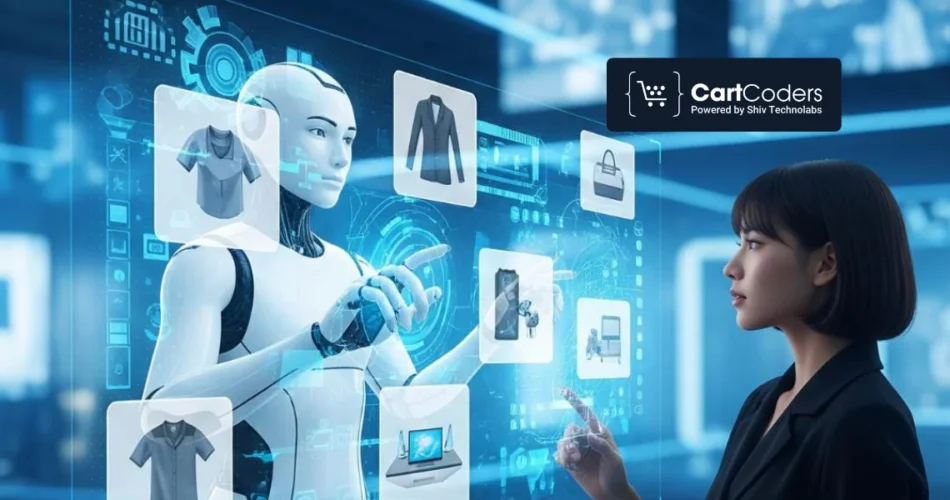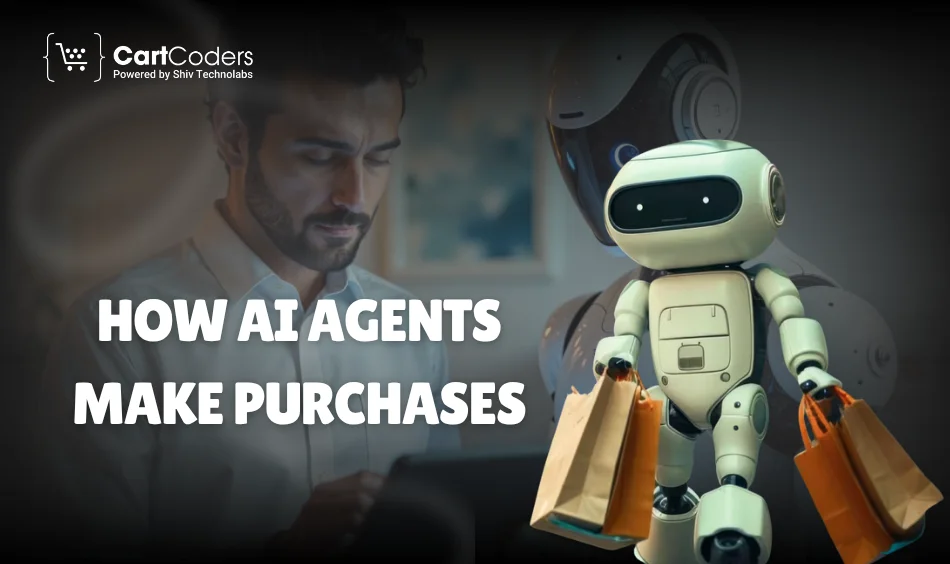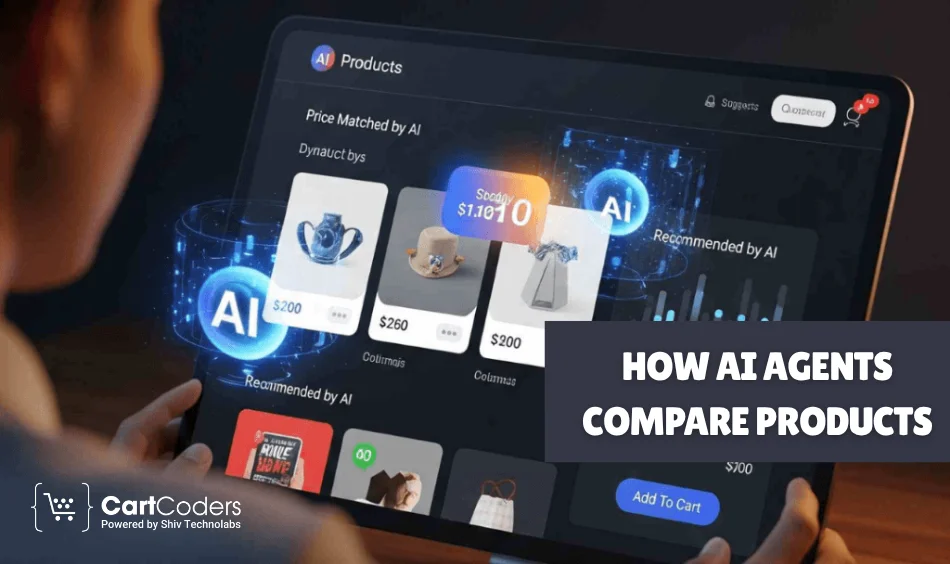Custom Engagement Solutions
Unlock tailored solutions with a free, no-obligation strategy session.
Expert Developers & Engineers on Demand
Scale Your Team with Skilled IT Professionals
Expert Guidance for Digital Transformation

Agentic commerce represents a fundamental shift in how Americans will shop online. Instead of browsing products and adding them in the cart, consumers will now simply tell an AI shopping agent about their requirements, and the entire shopping process right from research to checkout will be handled, without human intervention.
These intelligent systems are programmed to understand preferences, compare multiple available options instantly, and complete purchases autonomously.
For the US eCommerce space, this transforms the entire customer journey. Shopping becomes conversational and delegated rather than manual and time-consuming. This article explores how AI agents make purchases, the differences between agentic AI vs chatbots, how customer trust in AI agents will be built, and what the future holds for American retailers.
At their core, AI shopping agents are autonomous software systems powered by advanced language models and decision-making algorithms. Unlike basic recommendation engines, these agents can independently research, evaluate, and purchase items on behalf of users.
Examples of what are AI shopping agents include personal shopping assistants that monitor your pantry and reorder groceries when supplies run low, travel agents that book entire vacations based on budget and preferences, and gift buyers that select appropriate presents by analyzing recipient interests.
The key distinction lies in autonomy. Traditional recommendation systems display options and wait for human approval. True AI shopping agents execute entire transactions independently once given permission and parameters.

Understanding how AI agents make purchases requires breaking down their decision-making workflow. The process demonstrates sophisticated reasoning that mirrors human shopping behavior.
The AI Agent Purchase Flow:
How AI agents make purchases also involves sophisticated payment protocols. Emerging standards like the Agent Payment Protocol (AP2) and Universal Cart systems allow agents to execute transactions securely across multiple retailers without storing sensitive payment data.
Many people confuse agentic AI vs chatbots, but the differences are profound.
| Feature | Traditional Chatbots | Agentic AI Shopping Agents |
| Autonomy | Responds to commands, requires constant input | Makes independent decisions within defined parameters |
| Decision-Making | Rule-based, follows scripts | Reasoning-based, adapts to complex scenarios |
| Purchase Capability | Links to products, requires human checkout | Can complete entire purchase autonomously |
| Customer Experience | Reactive support tool | Proactive shopping partner |
| Risks | Minimal, no autonomous actions | Potential for wrong purchases, requires trust mechanisms |
A chatbot is just programmed to answer your questions, whereas, an agentic AI shopping agent analyzes your past purchases, compares prices across retailers, finds the right match and completes the purchase.

The sophistication of how AI agents compare products goes far beyond simple price sorting. When AI agents compare products, they aggregate data from product detail pages (specifications, features, compatibility), customer reviews with sentiment analysis, pricing data including historical trends, return policies, inventory status, and seller reputation.
The ranking process applies weighted scoring based on user priorities. If a user emphasizes sustainability, the agent ranks products with eco-certifications higher. If speed matters most, two-day shipping options receive preference even at higher cost. This multi-criteria decision analysis evaluates each product across dozens of factors simultaneously, making nuanced trade-offs that reflect human values.
AI agent autonomous checkout represents the final and most critical step in the purchasing process. This capability transforms agents from research assistants into complete shopping solutions.
How autonomous checkout works: the agent adds selected items to the retailer’s cart via API, chooses appropriate shipping address, uses tokenized payment methods, and completes purchase while storing receipt information.
The risks of AI agent autonomous checkout include accidental purchases and technical errors. Retailers must balance frictionless automation with appropriate security measures to maintain customer trust in AI agents.
One of the most practical applications is how AI agents reorder automatically based on consumption patterns. For groceries, supplements, and daily-use products, agents track usage through smart home inventory, historical purchase frequency, or user-defined schedules with intelligent adjustments.
When AI agents reorder automatically, they don’t repeat past purchases blindly. There are multiple aspects that are considered that includes alternative products with better pricing and reviews, seasonal availability etc. For example if your preferred coffee brand is out of stock, the AI agent finds an alternate product that matches your brand and taste preferences.
This creates subscription-like recurring revenue for retailers without requiring customers to commit to subscriptions, resulting in higher customer lifetime value and predictable demand patterns.
The quality and structure of product data for AI agents will determine which retailers succeed in the agentic commerce era. Unlike humans who can interpret unclear information, AI agents require precise, structured data.
Essential Product Data Elements:
Answer Engine Optimization (AEO) becomes crucial for product discoverability. While traditional SEO targets human searches, AEO ensures that product data for AI agents can be easily parsed and evaluated by autonomous systems. Retailers who treat product data as a strategic asset will become preferred sources when AI agents compare products across the web.
The technical infrastructure relies heavily on APIs for agentic commerce that allow seamless interaction between AI agents and retailer systems. Without proper API access, agents must resort to web scraping, which is fragile and slow.
Essential Retailer APIs:
Emerging standards like the Agent Payment Protocol (AP2) create common frameworks for how AI agents make purchases across different retailers. These APIs for agentic commerce enable faster, more reliable transactions with better error handling, creating a new sales channel for retailers without cannibalizing existing traffic.
Building customer trust in AI agents represents the biggest barrier to mainstream adoption. Letting software spend your money autonomously requires a leap of faith.
Primary Consumer Concerns:
To establish customer trust in AI agents, developers must implement transparent safeguards including approval prompts for significant purchases, detailed explanations of why specific products were chosen, easy refund guarantees, spending limits with notification thresholds, and complete transaction histories.
Customer trust in AI agents will grow through gradual adoption. Early users will start with low-stakes purchases like household supplies before trusting agents with expensive decisions. As agents prove reliable, users will delegate more significant purchases.
AI agent transparency & explainability addresses the critical need for users to understand why their agents made specific purchasing decisions. Without clear reasoning, consumers remain uncomfortable delegating buying authority. Effective explainability means showing exactly how decisions were reached.
Key Transparency Elements:
AI agent transparency & explainability may soon become legally required. The FTC has shown increasing interest in AI commerce practices. Proactive transparency isn’t just about compliance—it’s good business that builds customer trust in AI agents.
The trajectory suggests rapid adoption over the next five years. By 2027, AI agents will likely handle 15-20% of routine purchases for early adopters. By 2030, this could expand to 40-50% of all eCommerce transactions.
Impact on Retailers:
Retailers who thrive will optimize for AI agents without abandoning human customers. The same transparency and data quality that AI agents demand also improves the experience for traditional shoppers.
To get your Shopify store ready for agentic commerce, you need AI-driven systems that connect seamlessly with autonomous shopping agents.
Our Shopify AI Development Services Include:
Future-proof your Shopify store with our custom AI integrations built for US shoppers and autonomous purchasing. Cartcoders specializes in preparing Shopify stores for the AI-driven future of commerce. Our team builds agent-ready infrastructure, optimizes product data for autonomous shoppers, and implements the APIs and transparency features that make your store competitive in the agentic commerce era. Partner with Cartcoders to future-proof your eCommerce business today.
Agentic commerce represents a fundamental evolution in American online shopping. AI shopping agents bring unprecedented convenience by handling the entire purchasing process autonomously. The technology enabling how AI agents make purchases is already here, built on advanced language models and emerging payment protocols.
The critical difference between agentic AI vs chatbots lies in autonomy—these are independent actors capable of executing transactions. Success requires retailers to provide comprehensive product data for AI agents, implement robust APIs for agentic commerce, and build customer trust in AI agents through transparency and reliable service.
The risks are real but manageable through appropriate guardrails. As AI agent transparency & explainability improves and early adopters prove the technology reliable, mainstream adoption will accelerate.
Agentic commerce is closer than most retailers expect. The infrastructure exists, consumer interest is growing, and early platforms are launching. Retailers who treat this as a distant possibility will find themselves at a severe disadvantage within just a few years. The time to prepare is now.
AI shopping agents are autonomous systems that research, evaluate, and purchase products on your behalf. They understand preferences through conversation or behavior, search across retailers, compare options based on your priorities, and complete purchases automatically.
Yes, but most include safeguards like spending caps and approval prompts for high-value items. You control how much autonomy your agent has.
AI agents aggregate specifications, customer reviews with sentiment analysis, pricing trends, return policies and seller reputation, when comparing products, and then give results based on your priorities.
AI agent autonomous checkout uses secure protocols like tokenized payments that never expose your payment information, with multi-factor authentication for large purchases and complete audit trails.
The key difference in agentic AI vs chatbots is autonomy. Chatbots help you find products but require manual checkout. AI shopping agents independently make purchasing decisions and complete transactions autonomously.
Projects delivered in 15+ industries.
95% retention rate, building lasting partnerships.
Serving clients across 25+ countries.
60+ pros | 10+ years of experience.